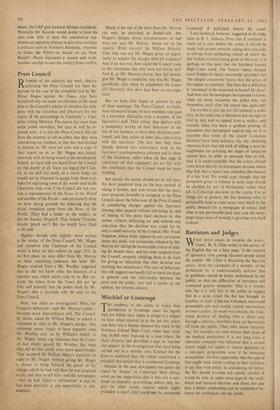Barristers and Judges
WHAT never ceases to surprise . the practi;. tioner,' R. A. Cline writes in his survey of the English Bar on a later page, 'is the amount of ignorance even among educated people abotif the system.' Mr. Cline is discussing the Bar con' amore, from the viewpoint of a member of the profession; he is understandably anxious that its problems should be better understood by the public, so that the difficulties of barristers will command greater sympathy. This is a worthy aim, but it is only fair to the public to suggest that to a great extent the Bar has brought its troubles on itself. It has not welcomed, and would presumably not now accept, outside intervention or even scrutiny. In many ways besides the tradi- tional practice of dealing with a client only through a solicitor, barristers have cut themselves off from the public. Their rules about 'advertis- ing,' for example. arc even stricter than those of the medical profession; it is not long since a television company was informed that a certain lawyer might not appear to answer questions on • a television programme even if he remained anonymous--for fear, apparently, that the sight of him might send clients rushing to their solicitors to ply him with briefs. In considering its future, the Bar should examine not merely whether it would be wise to make some gaps in the tradi- tional wall between barrister and client, but also how a better relationship can be established be- tween the profession and the public.






































 Previous page
Previous page